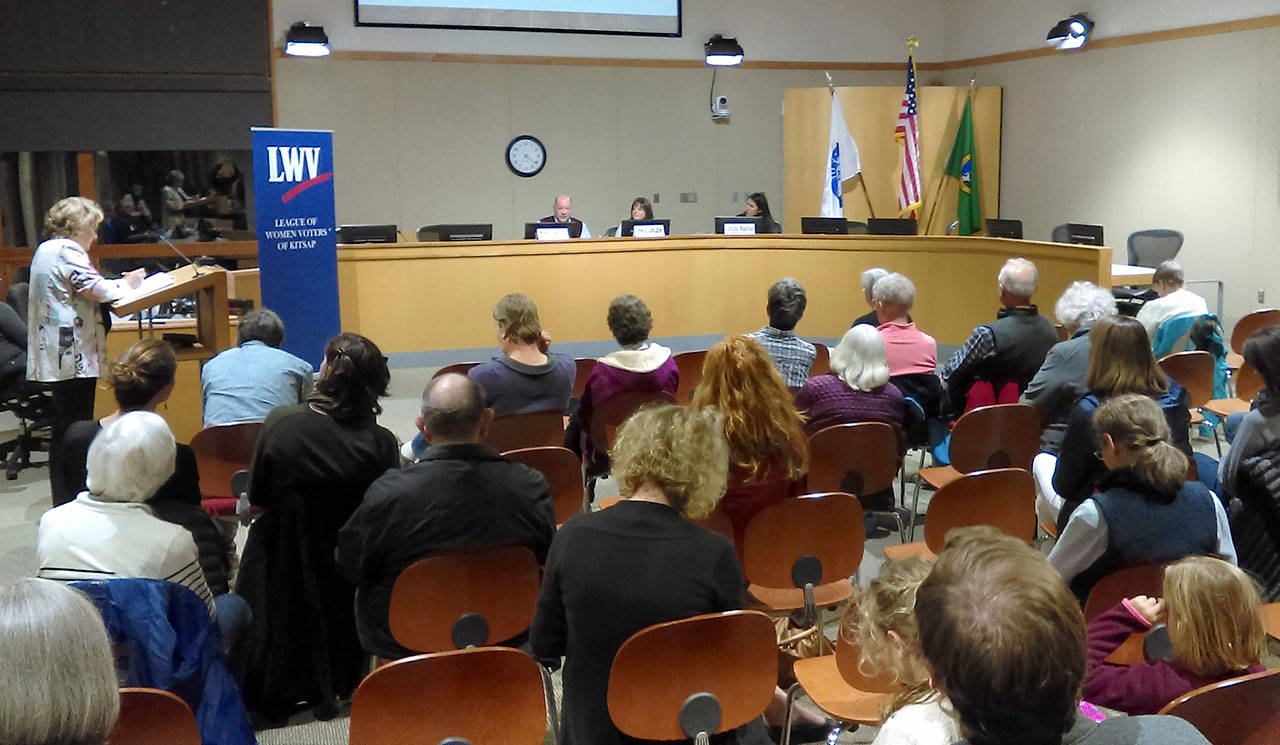The question of a proper guiding vision, and the importance of real world experience, are the two key points that separate the candidates for the District 5 position on the Bainbridge Island School Board, a four-year term position. Both incumbent Sheila Jakubik, who has held the job for the last four years, and newcomer Christina Wakefield sat before a crowd of about 45 people last week to field 14 questions on a variety of topics and make their respective cases during a forum hosted by the League of Women Voters of Kitsap at Bainbridge Island City Hall.
Mike Spence, who is running unopposed for re-election to the District 2 position now that Judy McLaughlin has dropped out of the race, also participated.
Both Jakubik and Wakefield were cordial and complimentary, often agreeing on the importance for increased attention or possible changes to areas of concern raised by attendees’ questions, including the nature of the board’s relationship with the superintendent, expanding Eagle Harbor High School, the fate of the Options program, and the appropriate level of police presence on campus.
In fact, few areas proved truly divisive, though both candidates had particularly heartfelt responses to questions regarding ways to better educate school staff about modern gender issues.
The question was: What is the school district undertaking now to educate teachers and staff regarding gender issues?
Jakubik said she was unsure exactly what training was currently being done, but believed, “tackling it in a meaningful way is hugely important.”
She was proud, she said, of the district’s steps thus far in advancing a conversation about the subject, saying that currently the school district has engaged nationally-recognized education expert Clay Roberts to work with the staff, and also at a recent parents’ event, as a way to address the issue.
Wakefiled, however, thought the question — and the issue itself — was instead indicative of a larger problem in the district.
“I applaud the district’s steps for opening the door to this conversation,” Wakefield said. “I would encourage us to really think about holistic approaches. Not just coping skills and stress management, but really thinking about where those things are started. Where are those roots? And, for me, they’re coming from this idea that comparing kids to one another from kindergarten.
“Happiness is not an absolute,” Wakefield continued. “Contentment is not an absolute. It’s always measured against someone else.”
Asked how the high cost of living, which makes Bainbridge a difficult place for young families to afford to relocate, will impact enrollment and budgeting in the future, the candidates again were split between a detailed-oriented and a big picture response.
Jakubik talked about specific responses, while Wakefield stressed the need for a refined overall vision and more clearly identified goals.
Spence actually spoke first, and took the chance to highlight that the dilemma affects not only families with school-age children, but also young teachers as well, a concern which was immediately echoed by his fellow current board member.
“I also agree that when teachers can’t live in the community that they’re teaching in — that is not ideal,” Jakubik said. “When young families cannot afford to move into the district, I do believe we’re seeing the effects of that. We had a graduating class of around 300. We have a kindergarten class of about 200. Because our funding is based partially on enrollment — largely on enrollment — that’s going to impact the district long term.”
It was the responsibility of the school district, Jakubik said, to reach out to legislators to discuss methods of adequate school funding, as well as the community “contacting the city council and talking about affordable housing on the island.”
Wakefield said that, expensive as it is, Bainbridge was still considerably less expensive than Seattle, and opined the issue might be larger than the school board’s purview.
“It’s still cheaper to live on Bainbridge than in Seattle itself,” Wakefield said. “And our school district is still good enough that you don’t have to send your child to private school.
“While I do agree that we should all be active in finding common solutions and discussing this issue of affordable housing, I think it’s a little beyond what the school board’s mandate can really take on — [even] if we can contribute to the conversation.”
In their closing remarks, one more issue of minor contention arose when Wakefield raised the issue of elementary school classes she claimed were overcrowded.
“I think our class sizes, especially at the elementary school, are at a breaking point,” Wakefield said. “We really need to think about that. We can’t talk about social-emotional learning with 30 kids in the second grade.”
Jakubik though, in her own final remarks, was quick to point out that, “our class size limit at the elementary school is 24.”
“It’s really hard to get at the depth and complexity of all the questions we have before us in this short amount of time,” Jakubik added. “I hope if you have more questions for me that you feel free to contact me and I’ll be happy to answer those.
“I absolutely love this work. I’m passionate about this work,” she concluded.
Wakefield, admitting she was “new to the field of education,” said supporting innovation and creativity among teachers and taking a holistic approach to board decisions were the tenets of her campaign.
“I just want to reiterate how much I love being a part of this community and how proud I am to have the opportunity to potentially serve it in this way,” Wakefield said.


